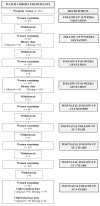Macronutrient Intake in Pregnancy and Child Cognitive and Behavioural Outcomes
- PMID: 34065501
- PMCID: PMC8161020
- DOI: 10.3390/children8050425
Macronutrient Intake in Pregnancy and Child Cognitive and Behavioural Outcomes
Abstract
Prenatal nutrient exposures can impact on brain development and disease susceptibility across the lifespan. It is well established that maternal macronutrient intake during pregnancy influences foetal and infant development. Therefore, we hypothesise that macronutrient intakes during pregnancy are correlated with cognitive development during early childhood. The current study aimed to investigate the relationship between maternal macronutrient intake during pregnancy and child cognitive and behavioural outcomes at age 4 years. We analysed prospective data from a cohort of 64 Australian mother-child dyads. Maternal macronutrient intake was assessed using a validated 74-item food frequency questionnaire at 2 timepoints during pregnancy. Child cognition and behaviour were measured at age 4 years using the validated Wechsler Preschool and Primary Scale of Intelligence, 3rd version (WPPSI-III) and the Child Behaviour Checklist (CBC). Linear regression models were used to quantify statistical relationships and were adjusted for maternal age, education, pre-pregnancy BMI, breastfeeding duration and birthweight. Child Performance IQ was inversely associated with maternal starch intake (b = -11.02, p = 0.03). However, no other associations were found. Further research is needed to explore the association between different types of starch consumed during pregnancy and child cognitive development.
Keywords: behaviour; cognition; development; macronutrients; nutrition; pregnancy.
Conflict of interest statement
The authors declare no conflict of interest.
Figures
References
-
- Linderkamp O., Janus L., Linder R., Skoruppa D.B. Time table of normal foetal brain development. Int. J. Prenat. Perinat. Psychol. Med. 2009;21:4–16.
LinkOut - more resources
Full Text Sources


